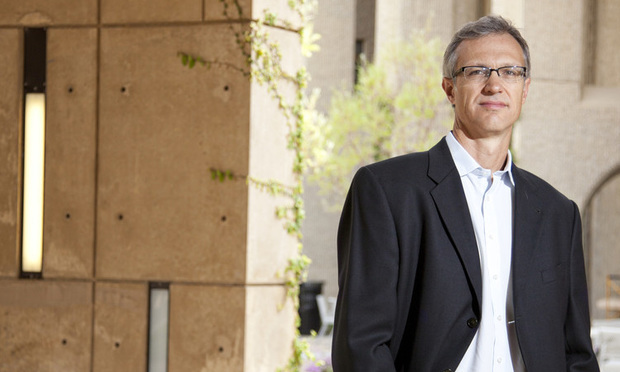Stanford Law's Jeffrey Fisher, Veteran SCOTUS Lawyer, Joins O'Melveny as Special Counsel
Fisher, who has argued 35 cases before the high court, will maintain his position at Stanford and as co-director of its Supreme Court clinic, a position he's held since 2006.
April 23, 2018 at 08:00 AM
4 minute read
 Jeffrey Fisher, Stanford Law School professor. Credit: Jason Doiy/ ALM
Jeffrey Fisher, Stanford Law School professor. Credit: Jason Doiy/ ALM O'Melveny & Myers is beefing up its U.S. Supreme Court and appellate practice with the addition of Stanford Law School professor Jeffrey Fisher, one of the most frequent advocates at the court, as special counsel.
The firm is set to announce Monday its new relationship with Fisher, who will maintain his position at Stanford and as co-director of its Supreme Court clinic, a position he's held since 2006.
The 47-year-old Fisher has argued 35 cases before the high court, including three this term that are pending decisions. Known for his straightforward advocacy, Fisher has argued both criminal and civil cases in his capacity as a Stanford professor and in prior private practice at Davis Wright Tremaine. He was co-counsel in the Kentucky case that was part of the same-sex marriage litigation at the Supreme Court in 2015.
Among his other notable cases was the 2007 Exxon Valdez oil spill case Exxon Shipping v. Baker, in which his adversary was O'Melveny partner and former acting U.S. Solicitor General Walter Dellinger.
“Jeff was terrific. He is one of the best lawyers to work with and to have as an adversary,” Dellinger said in an interview. Negotiations to bring Fisher on board at O'Melveny have been going on for several months, Dellinger said, but “my aspirations [to engage Fisher] go back a long ways. Jeff is a spectacular addition to our appellate practice.”
Jonathan Hacker, chairman of O'Melveny's Supreme Court and appellate practice, has known Fisher for nearly 20 years. “His commanding advocacy skills are matched by his personal warmth and charm,” Hacker said in a statement. “He will connect with our colleagues and clients as easily as he connects with courts.”
Hacker and Fisher have been longtime members of the National Association of Criminal Defense Lawyers amicus curiae committee. Fisher is a former clerk to Justice John Paul Stevens and the late Ninth Circuit Judge Stephen Reinhardt.
Dellinger said Fisher will bolster the practice after some of its key members, including Sri Srinivasan, Pamela Harris, John Owens and Goodwin Liu, left O'Melveny for appellate judgeships on the D.C. Circuit, the Fourth Circuit, the Ninth Circuit and the California Supreme Court, respectively.
In an interview, Fisher said he was drawn to O'Melveny in part because of its “great commitment to pro bono work.” He said he got to know and like Dellinger during the “hard-fought” Exxon Valdez case.
In addition to “pitching in” on O'Melveny cases, Fisher said the firm may assist the Stanford clinic on pro bono cases that come to the clinic, especially during the summer when it is not operating with a full complement of students.
Fisher burst onto the Supreme Court scene in 2003 and 2004 with arguments in two groundbreaking criminal cases—Blakely v. Washington on sentencing, and Crawford v. Washington on the confrontation clause. He was a fifth-year associate at Davis Wright at the time. He won both cases in decisions authored by Justice Antonin Scalia. In 2006, The National Law Journal named him one of the nation's 100 most influential lawyers.
After Fisher took on Exxon Shipping in the 2007 Exxon Valdez case, Slate's Dahlia Lithwick gave Fisher a different kind of accolade: “In addition to having the best hair of the Supreme Court appellate bar, he is also one of its coolest new additions.”
Asked about the hair compliment last week, Fisher said with a laugh, “I don't know if that was a favor or a curse.”
Read more:
Revenue Inches Up at O'Melveny as Partner Profits Top $2M
Stanford No. 3 Among Supreme Court Feeder Schools
On Heels of Merger Talks, O'Melveny Picks Up Ex-Federal Prosecutor
This content has been archived. It is available through our partners, LexisNexis® and Bloomberg Law.
To view this content, please continue to their sites.
Not a Lexis Subscriber?
Subscribe Now
Not a Bloomberg Law Subscriber?
Subscribe Now
NOT FOR REPRINT
© 2025 ALM Global, LLC, All Rights Reserved. Request academic re-use from www.copyright.com. All other uses, submit a request to [email protected]. For more information visit Asset & Logo Licensing.
You Might Like
View All
4th Circuit Upholds Virginia Law Restricting Online Court Records Access
3 minute read
Supreme Court Considers Reviving Lawsuit Over Fatal Traffic Stop Shooting

Is 1st Circuit the New Center for Trump Policy Challenges?

Insurance Policies Don’t Cover Home Depot's Data Breach Costs, 6th Circuit Says
Trending Stories
Who Got The Work
J. Brugh Lower of Gibbons has entered an appearance for industrial equipment supplier Devco Corporation in a pending trademark infringement lawsuit. The suit, accusing the defendant of selling knock-off Graco products, was filed Dec. 18 in New Jersey District Court by Rivkin Radler on behalf of Graco Inc. and Graco Minnesota. The case, assigned to U.S. District Judge Zahid N. Quraishi, is 3:24-cv-11294, Graco Inc. et al v. Devco Corporation.
Who Got The Work
Rebecca Maller-Stein and Kent A. Yalowitz of Arnold & Porter Kaye Scholer have entered their appearances for Hanaco Venture Capital and its executives, Lior Prosor and David Frankel, in a pending securities lawsuit. The action, filed on Dec. 24 in New York Southern District Court by Zell, Aron & Co. on behalf of Goldeneye Advisors, accuses the defendants of negligently and fraudulently managing the plaintiff's $1 million investment. The case, assigned to U.S. District Judge Vernon S. Broderick, is 1:24-cv-09918, Goldeneye Advisors, LLC v. Hanaco Venture Capital, Ltd. et al.
Who Got The Work
Attorneys from A&O Shearman has stepped in as defense counsel for Toronto-Dominion Bank and other defendants in a pending securities class action. The suit, filed Dec. 11 in New York Southern District Court by Bleichmar Fonti & Auld, accuses the defendants of concealing the bank's 'pervasive' deficiencies in regards to its compliance with the Bank Secrecy Act and the quality of its anti-money laundering controls. The case, assigned to U.S. District Judge Arun Subramanian, is 1:24-cv-09445, Gonzalez v. The Toronto-Dominion Bank et al.
Who Got The Work
Crown Castle International, a Pennsylvania company providing shared communications infrastructure, has turned to Luke D. Wolf of Gordon Rees Scully Mansukhani to fend off a pending breach-of-contract lawsuit. The court action, filed Nov. 25 in Michigan Eastern District Court by Hooper Hathaway PC on behalf of The Town Residences LLC, accuses Crown Castle of failing to transfer approximately $30,000 in utility payments from T-Mobile in breach of a roof-top lease and assignment agreement. The case, assigned to U.S. District Judge Susan K. Declercq, is 2:24-cv-13131, The Town Residences LLC v. T-Mobile US, Inc. et al.
Who Got The Work
Wilfred P. Coronato and Daniel M. Schwartz of McCarter & English have stepped in as defense counsel to Electrolux Home Products Inc. in a pending product liability lawsuit. The court action, filed Nov. 26 in New York Eastern District Court by Poulos Lopiccolo PC and Nagel Rice LLP on behalf of David Stern, alleges that the defendant's refrigerators’ drawers and shelving repeatedly break and fall apart within months after purchase. The case, assigned to U.S. District Judge Joan M. Azrack, is 2:24-cv-08204, Stern v. Electrolux Home Products, Inc.
Featured Firms
Law Offices of Gary Martin Hays & Associates, P.C.
(470) 294-1674
Law Offices of Mark E. Salomone
(857) 444-6468
Smith & Hassler
(713) 739-1250








